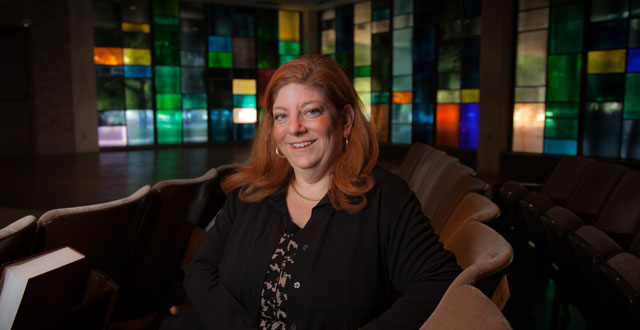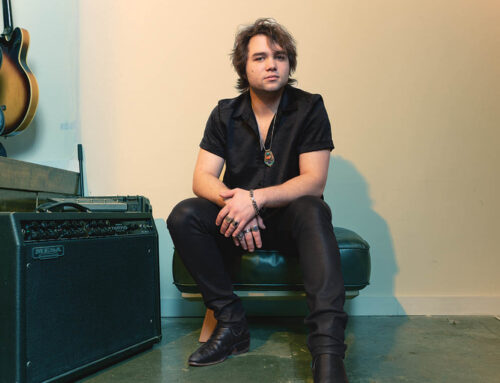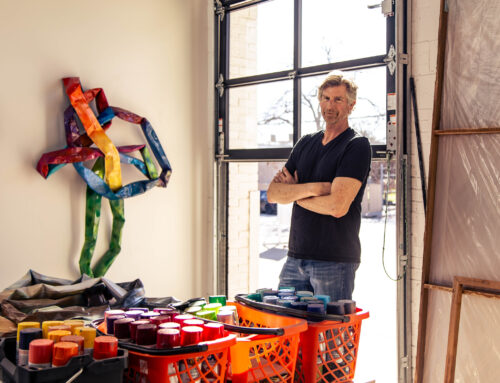
Kim Kamen: Photo by Kim Leeson
Kim Kamen has an iPhone app called Red Alert that notifies her every time Hamas launches a missile into Israel. She downloaded the app for extra security while leading a group of American Jewish Committee members on a trip to the country in July. Weeks later, back in her Preston Hollow office thousands of miles away, she still receives the Red Alert notifications; her phone vibrated three times during our hour-long talk. “There’s another one,” she says, solemnly shaking her head, as if in some small way she had brought the war home with her. Kamen is the associate director of the regional offices for the AJC, an organization with a strong neighborhood presence. During a recent trip to Israel, members met with leaders and civilians on both sides of the months-long conflict between Israel and Hamas, witnessing first-hand its effects on everyday life.
First, can you tell me a little about the American Jewish Committee?
We’re not a religious organization, though the name might seem that way. We do have a vested interest in protecting Jewish communities. We are very often standing up for any religious minority that is in crisis. AJC is often dubbed the state department of the Jewish people, and by that I mean we have top-level relationships with diplomats and consuls general on a local level. Our D.C. and New York offices, where the different headquarters are, work very closely with ambassadors, foreign ministers, presidents and prime ministers. Every year in September we have what’s called the diplomatic marathon, and it sort of runs on the sidelines of the U.N.
There was a case about five years ago of a Native American boy who was entering kindergarten in the town of Needham, Texas. This young boy was asked by the school district to cut his braid, and the family didn’t want to do that because it would be an affront to their religion. The school district wanted to fight it. It went to the Supreme Court, and AJC worked closely with a few other national organizations to protect the rights of this particular boy and won. So, that’s the kind of work that we do.
What prompted the trip to Israel?
It was through a special program of AJC called Project Interchange. It has brought over, I think, 6,000 high-level officials in targeted careers. We’ve brought governors, mayors, presidents of universities and provosts, we have brought media, we have brought Latino leaders from the U.S. There were media members from Scandinavia last year. There were Muslim leaders from India. The speakers are not simply Israeli Jews who talked about things from their perspective. We met with Arabs, Arab Christians, Arab Palestinians. We met with people who were brutally honest about the positives and negatives of Israeli society. It was as raw and real as you could get. It’s not all flattering of Israel. It’s not dissimilar to someone talking about the U.S. We had never come face-to-face with some of these issues that we are working on 24/7.
What was it like being there amid a war, in terms of daily life?
It was surreal. During our first few days we were in Tel Aviv, which is a modern city a la New York. It’s also on a beach, so it is breathtakingly beautiful. The very first day, we were in a conference room in the hotel. You could see surfers outside just having a great time on the beach. It was the one and only time that there was a loud alarm where we had to get up, move into a stairwell, wait about five minutes and then come back and continue. Surfers got up, left the waves, moved to a rock embankment and kind of lay down for a few minutes and then got up and went back into the surf. People in a coffee shop, for example, left their coffee and went into the back of the shop. A few minutes later they came back to their coffee. The rockets that keep coming in and coming in tend to be more in the southern part of Israel. They’re pretty close to the Gaza border. We were in Tel Aviv for about 24 hours when we heard the Iron Dome intercepting rockets [the defense system breaks up rockets before they land in Israel].
During the second portion of the trip we went up to the northern part of Israel, and what was fascinating was that while we were receiving fewer sirens, we could actually stand in the Golan mountains and hear the fighting in Syria, which blew my mind because you’re reading about the awful things that are happening with [President of Syria] Assad and the civil war going on. We could hear the gunfire. We could hear the cannons. We couldn’t see it, but we could hear it, and it brought everything to this incredible reality.
[quote align=”left” color=”#000000″]”We could actually stand in the Golan mountains and hear the fighting in Syria”[/quote]Is it strange to see that way of life become rote over there?
It became normal because you know the Iron Dome is there to protect you. It is different, but when you think about how traumatized we were shortly after 9/11, and we saw armed guards at airports and all the security, it felt strange. It was very upsetting. We’re now used to it. That’s how they live their lives all the time. But it is sad. If you go down to Sderot, one of the cities on the Gaza border, they have an entire indoor playground. They’ve painted a ceiling of sunny skies. But in Sderot, if a siren goes off, they have 15 seconds to seek shelter. Where we were, in Tel Aviv, we had 90 seconds. That can make a huge difference.
What was the overall sense of public opinion about the conflict?
They often would point out that if Canada or Mexico were to lob rockets in the U.S. would you, the U.S., sit by idly and let that happen? They have done that. They have been very patient. About 100 rockets had come into Israel and [Israel] waited and waited patiently. It was when those three teenagers were kidnapped and killed. That was the straw that broke the camel’s back. They said they could not abide any longer and allow their country’s innocent civilians to be subjected to this.
What is the most important message you received from people there that maybe we aren’t hearing over here?
The diversity of Israel is both a blessing and a curse to the country, but predominantly a blessing. Whether you stand on the Palestinian side or on the Israeli side, most — not all — but most people at the end of the day want to live in harmony with one another. Time and time again we found that people want peace. It was ultimately an optimistic message.






